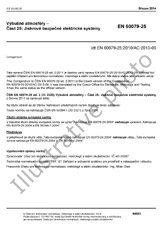We need your consent to use the individual data so that you can see information about your interests, among other things. Click "OK" to give your consent.

IEEE White Paper
Overview and Insight: Resilience Across the Education Ecosystem During the COVID-19 Pandemic
Translate name
STANDARD published on 3.1.2023
| Availability | IN STOCK |
| Price | ONREQUEST excl. VAT |
| ON REQUEST |
The information about the standard:
Designation standards: IEEE White Paper
Publication date standards: 3.1.2023
SKU: NS-1196613
Approximate weight : 300 g (0.66 lbs)
Country: International technical standard
Category: Technical standards IEEE
Annotation of standard text IEEE White Paper :
- Active.
In response to the education crisis during restrictions of COVID-19 pandemic, continuation of education was carried out through broadcasting and digital technologies. However, the majority of children around the world are seen to not have access to such technology. For those who have access to technology and devices, education delivery has not been effective due to lack of digital skills in educators and learners. For those with internet access and digital skills, challenges of online exploitation, violence, and exposure to harmful content is felt. In such a scenario, in order to achieve Sustainable Development Goal SDG 4, adoption of holistic e-resilience by design is needed to help ensure that education is inclusive and fit for the future. But in order to succeed, all stakeholder involvement from the entire ecosystem is essential. This paper has examined critical aspects across the educational ecosystem, highlighted gaps in essential components, and posed alternative approaches and policy reforms. Multiple dimensions necessary for e-resilient education system have been considered while making the recommendations. National policies and multilateral collaborative approaches are needed to bridge the digital divide and help ensure broadband connectivity for digital education of all students. It is also important to overcome any linguistic barrier. Encouraging technologies to develop educational contents in local language can ensure that language digital divide is bridged. Another important aspect of a resilient education system is putting efforts in improving digital skills of educators and learners. Digital literacy programs must be implemented effectively in order to achieve a digitally competent population. The next pertinent aspect is measurement of learning outcomes of students. Different approaches are needed to measure and ensure that meaningful learning is taking place in digital space. It is also important to consider that the content of learning is relevant to the student and the economy, as well as that the means of delivery must also accommodate the learning needs of students. A greater emphasis on digital transformation of technical and vocational education and training in alignment to the labor market must be given while developing curriculum for education.
ISBN: 978-1-5044-9288-1
Number of Pages: 26
Product Code: STDVA25845
Keywords: education, e-resilient, gaps, initiative, resilient education systems, white paper
Category: Education
We recommend:
Technical standards updating
Do you want to make sure you use only the valid technical standards?
We can offer you a solution which will provide you a monthly overview concerning the updating of standards which you use.
Would you like to know more? Look at this page.



 Cookies
Cookies
